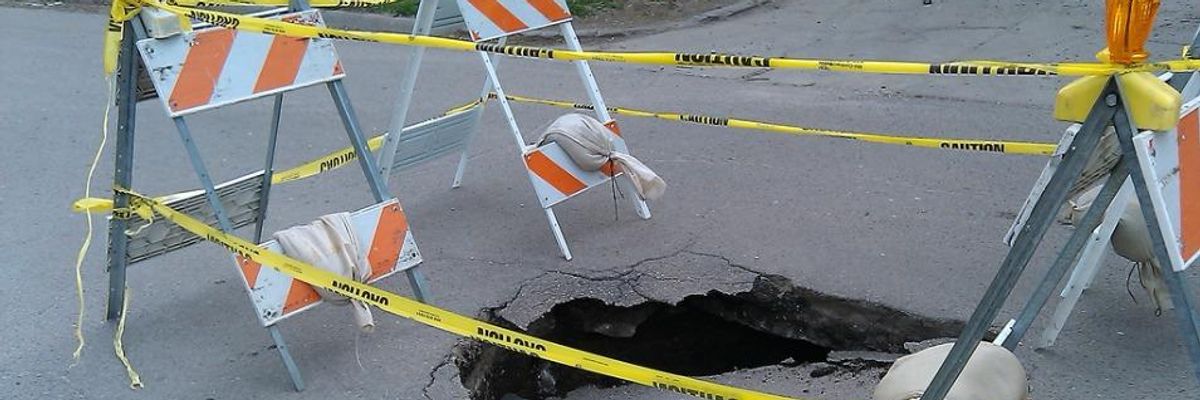In an op-ed published Tuesday, U.S. Senator Bernie Sanders (I-VT) pointed to Monday's Cincinnati bridge collapse, which killed one person, as further evidence that the U.S. desperately needs to upgrade its infrastructure--from bridges and roads to railways and levees.
"Our infrastructure is collapsing, and the American people know it," wrote Sanders, the ranking member of the Senate Budget Committee and a member of the Senate Environment and Public Works Committee. "The Interstate 75 bridge collapse in Cincinnati on Monday is only the latest example."
The Cincinnati overpass, which was undergoing demolition, collapsed late Monday and killed a construction worker.
While the overpass did not appear to have any structural issues, one of nine bridges in the U.S. is in fact structurally deficient and nearly a quarter are functionally obsolete, Sanders said--illustrating his point: "For many years we have underfunded the maintenance of our nation's physical infrastructure. That has to change. It is time to rebuild America."
Sanders said he will soon announce legislation for a $1 trillion investment, over five years, to modernize the country's physical infrastructure and create 13 million jobs.
In 2013, the American Civil Society of Engineers gave the U.S. a D+ grade on its infrastructure, estimating that $3.6 trillion in investment was necessary to fix the nation's highways, dams, rail and aviation systems, and more.
Earlier this month, the Obama administration announced new steps, as part of the Build America Investment Initiative, to improve ports, roads, bridges, broadband networks, drinking water and sewer systems, and other projects.
But Obama's proposals show that "progressives will be on their own in the battle to boost public investment in our public assets," progressive analyst Isaiah Poole wrote last week.
Of the initiatives announced last Friday--an infrastructure bonds program designed to attract private financing for transportation projects and a new Water Finance System at EPA to improve drinking and waste water systems across the country--Poole said:
These are workarounds for the combination of cowardice and obstructionism that has kept the federal government from doing what it used to do reasonably well and what it must learn how to do even better today: fund infrastructure in a way that serves the public interest, supports a growing economy and puts people back to work at good-paying jobs.
Leading the obstruction, of course, is conservatives in Congress, some of whom go beyond saying we can't afford the additional $1 trillion we should be spending on our transportation, water and electrical networks between now and 2020 to saying we shouldn't spend those dollars at the federal level even if we could afford it--that the main task of improving our infrastructure should be left to states, localities and the private sector.
But the U.S. already spends a paltry amount on such projects, Sanders said.
"The United States now spends just 2.4 percent of GDP on infrastructure, less than at any point in the last 20 years," he argued. "Europe spends twice that amount, and China spends close to four times our rate. We are falling further and further behind, and the longer we wait, the more it will cost us later. Deteriorating infrastructure does not magically get better by ignoring it."

